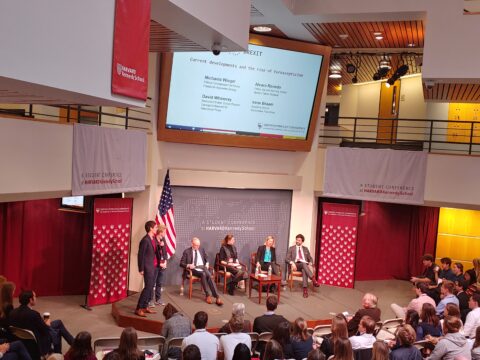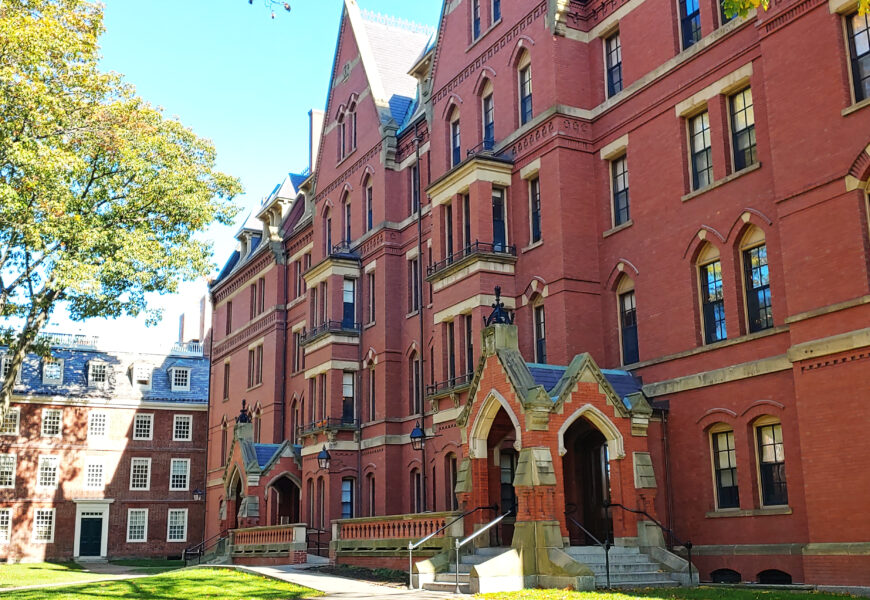Walking through the Harvard University campus. Photos courtesy of Sophia Angele-Kuehn.
At 5 am on a frigid Saturday morning, three other students from the German Club and I called an Uber to take us to the train station for our trip to Cambridge, Massachusetts. We wanted to catch the day’s first panel discussion at the German-American Conference at Harvard University, held Nov. 1-3 at the sparkling Harvard Kennedy School. Once we found the building and checked in, I helped myself to a crimson pin featuring the crest of the conference, which combines the German and American flags. After meeting up with Professor Machtans and Professor Atherton, both associate professors of the German Studies department at Conn, we filed into a corner of the first floor sectioned off with crimson curtains to listen to a panel on “Fighting the Climate Crisis” (featuring Luisa Neubauer, the 23-year-old head of Fridays for Future school strikes in Germany), and then another on Brexit (facilitated by a political correspondent of France for a German newspaper). After the second talk ended and we stood up to leave, one of my friends commented, “It was interesting, but I didn’t learn anything new.” Hearing adults lecture us about protesting and engaging in politics was unhelpful advice.
Harvard Kennedy School was overwhelmed with masses of young adults clad in black business attire, almost all of them conversing in German. I was reminded of the hyphenated title of the conference: German-American, with “German” coming first. I wondered just how many of its smiling participants also identified themselves in that way.

Graduate students presenting at the 2019 German-American Conference in October.
Just days later, I presented a talk on my own hyphenated German-American identity at Connecticut College’s inaugural All-College Symposium on Nov. 7. As a scholar in CISLA, I’m writing an Honors Thesis on transnational identity as depicted in written and spoken narratives — specifically, how the memoir written by my grandfather about his immigration to the U.S. and the stories told by my parents have influenced my identity today. I gave a ten-minute talk that day like all of the seniors who are part of Centers and Pathways who presented their barrier-breaking projects to faculty, staff, students, and visitors.
The German-American Conference is organized by Harvard Kennedy School’s graduate students, yet comprised of expert panel discussions and key-note speeches during three days. The All-College Symposium is organized by Assistant Dean of the College for Connections Libby Friedman, yet focuses entirely on students’ research during an all-day event. Our projects are fulfilling Conn’s Connections curriculum of synthesizing multiple viewpoints and coming up with breakthrough ideas to make an impact and inspire others, according to the Connecticut College website. The German-American Conference at Harvard exuded prestige and importance, and was targeted at young professionals. However, why did I feel uninspired?
It was only during the last lecture of the conference when we all felt the inspiration and thrill that comes after connecting seemingly scattered dots. In a lecture hall hidden on the second floor, a human rights activist and researcher from the University of Kassel and an associate professor of history from Indiana University spoke about “Colonial Legacies in the US and Germany.” We listened, captivated. After the conference, it turned out that I learned the most from activists my age and university professors than politicians and CEOs who have to plan out the politics of every vague statement they make.
This was also my first time visiting Harvard University. My friends and I decided to explore Cambridge and Harvard Yard, where college students were replaced by tourists, self-conscious perspectives, and influencers posing for Instagram on the steps of Widener Library. Every other person was clad in oversized Harvard sweatshirts and “H” baseball caps. I have never been to Disneyland, but I imagine that that is what the oldest institution of higher education in the U.S. has turned into. I’m not in a position to say what Harvard is really like, since I’m not a student there. But after attending the conference, I was reminded that it’s the people, not the institution, which impacts the world. That which is said and by whom, instead of where.
Why travel two hours when one can find a great symposium at Conn? In this issue of The College Voice, Arts Editor Sara Abbazia walks through presentations focused on intersectionality at the All-College Symposium. Staff Writer Eli Christopher comments on the legacy of American movies about enslavement in his review of the recently released film Harriet, while Contributing Writer Maggie McCutcheon advertises Conn’s new Race and Ethnicity Concentration offered under the English major.
I’m grateful that Connecticut College is not a tourist trap where an image holds more value than revolutionary ideas. Just as resident rapper Cryptic aptly says it in his most recent music video, “I feel like Conn need an anthem.” This place is that special. •
— Sophia










